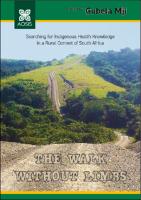The walk without limbs
Searching for indigenous health knowledge in a rural context in South Africa
| dc.contributor.author | Mji, Gubela | |
| dc.contributor.author | Alperstein, Melanie | |
| dc.contributor.author | Bongokazi Mlenzana, Nondwe | |
| dc.contributor.author | Galloway, Karen | |
| dc.contributor.author | Ohajunwa, Chioma | |
| dc.contributor.author | Ned, Lieketseng | |
| dc.contributor.author | Tshabalala, Ntombekhaya | |
| dc.contributor.editor | Mji, Gubela | |
| dc.date.accessioned | 2020-05-12T09:24:54Z | |
| dc.date.available | 2020-05-12T09:24:54Z | |
| dc.date.issued | 2019 | |
| dc.identifier | ONIX_20200512_9781928523123_7 | |
| dc.identifier | OCN: 1226206578 | |
| dc.identifier.uri | http://library.oapen.org/handle/20.500.12657/37695 | |
| dc.description.abstract | In a country as diverse as South Africa, sickness and health often mean different things to different people – so much so that the different health definitions and health belief models in the country seem to have a profound influence on the health-seeking behaviour of the people who are part of our vibrant, multicultural society. This book is concerned with the integration of indigenous health knowledge (IHK) into the current Western--orientated Primary Health Care (PHC) model. The first section of the book highlights the challenges facing the training of health professionals using a curriculum that is not drawing its knowledge base from the indigenous context and the people of that context. Such professionals will later recognise that they are walking without limbs in matters pertaining to health. The area that was chosen for conducting the research was KwaBomvana in Xhora (Elliotdale), Eastern Cape province, South Africa. The people who reside there are called AmaBomvana. The area where the Bomvana peoples reside is served by Madwaleni Hospital and eight surrounding clinics. Qualitative ethnographic, feminist methods of data collection supported the research done for Section 1 of the book. Section 2 comprises the translation and implementation of PhD study outcomes and had contributions from various researchers. In the critical research findings of the PhD study, older Xhosa women identify the inclusion of social determinants of health as vital to the health problems they managed within their homes. For them, each disease is linked to a social determinant of health, and the management of health problems includes the management of social determinants of health. For them, it is about the health of the home and not just about the management of disease. They believe that healthy homes make healthy villages, and that the prevention of the development of disease is related to the strengthening of the home. Health and illness should be seen within both physical and spiritual contexts; without health, there can be no progress in the home. When defining health, the older Xhosa women add three critical components to the WHO health definition, namely, food security, healthy children and families, and peace and security in their villages. Prof. Mji further proposes that these three elements should be included in the next revision of the WHO health definition because they are not only important for the Bomvana people where the research was conducted, but also for the rest of humanity. In light of the promise of National Health Insurance and the revitalisation of PHC, this book proposes that these two major national health policies should take cognisance of the IHK utilised by the older Xhosa women. In addtion to what this research implies, these policies should also take note of all IHK from the indigenous peoples of South Africa, Africa and the rest of the world, and that there should be a clear plan as to how the knowledge can be supported within a health care systems approach. | |
| dc.language | English | |
| dc.subject.classification | thema EDItEUR::V Health, Relationships and Personal development::VX Mind, body, spirit::VXH Complementary therapies, healing and health::VXHT Traditional medicine and herbal remedies | en_US |
| dc.subject.other | Africa | |
| dc.subject.other | ancestor reverence | |
| dc.subject.other | Bomvana | |
| dc.subject.other | community | |
| dc.subject.other | culture | |
| dc.subject.other | indigenous health knowledge | |
| dc.subject.other | healers | |
| dc.title | The walk without limbs | |
| dc.title.alternative | Searching for indigenous health knowledge in a rural context in South Africa | |
| dc.type | book | |
| oapen.identifier.doi | 10.4102/aosis.2019.BK98 | |
| oapen.relation.isPublishedBy | d7387d49-5f5c-4cd8-8640-ed0a752627b7 | |
| oapen.pages | 458 | |
| oapen.place.publication | Durbanville |

